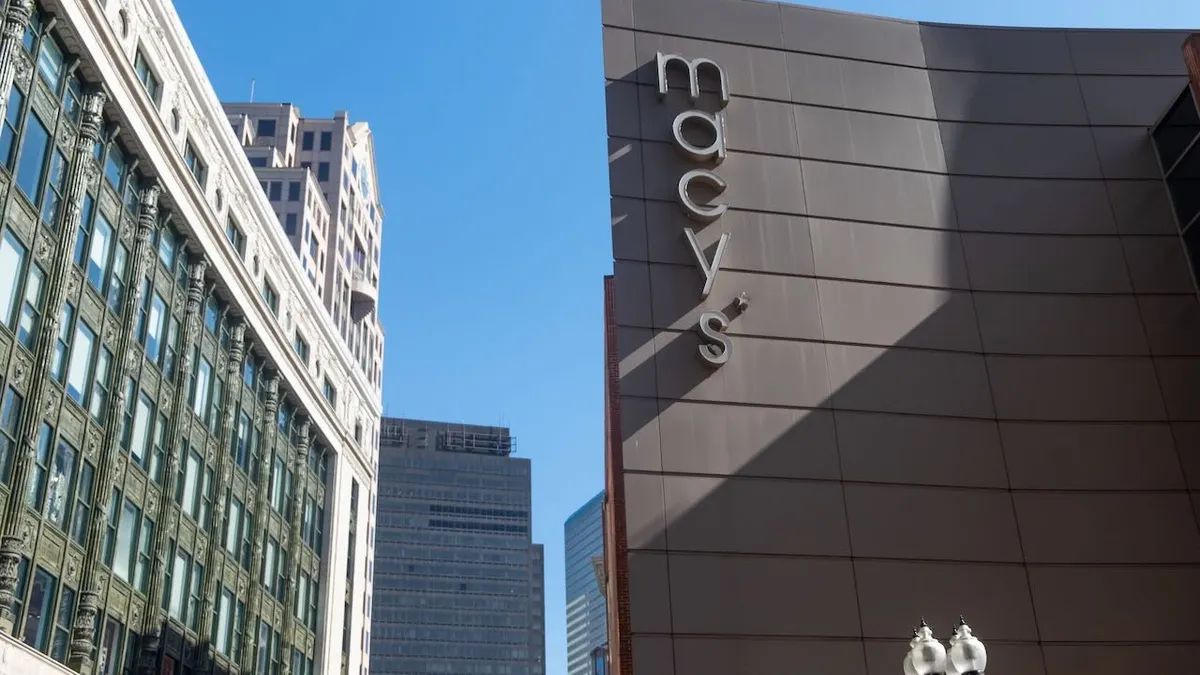Dive Brief:
-
Macy's on Wednesday reported that first quarter net sales fell to $3 billion from $5.5 billion in the year-ago quarter. The department store didn't report store comps for the period. Gross margin (net sales less cost of sales) contracted to $516 million or 17.1% of sales, from $2.1 billion or 38.2% of sales a year ago, according to a company press release.
-
The company swung to a $3.6 billion loss, from net income of $136 million in the year-ago quarter, as operating loss reached $4.1 billion from operating income of $203 million a year ago. With stores forced closed for much of the quarter, the company took a $3.2 billion non-cash impairment charge, $3.1 billion as a non-cash goodwill impairment charge plus an $80 million impairment charge on long-lived tangible and right-of-use assets.
-
The retailer has now reopened "nearly all" its stores, but traffic has been particularly slow to recover at flagships and urban locations due to a fall-off in tourism and because traffic declines are more marked in densely populated areas, CEO Jeff Gennette told analysts Wednesday.
Dive Insight:
Aside from its massive write-down in the quarter, Macy's loss is more or less in line with the $1 billion slide it warned investors about last month.
The pandemic is hardly over and continues to vex public health officials and policy makers. But another blanket lockdown of retail stores is unlikely, Gennette said.
"While we're not anticipating a national shutdown, we do expect regional flareups," he said, noting that Texas and Georgia, two states where Macy's stores reopened first, recently instituted new guidelines that once again discouraged shopping and led to traffic declines.
The company is slashing costs, including cutting nearly 4,000 corporate jobs, or over 20% of its corporate workforce. That's on top of the layoffs affiliated with the company's previously announced Polaris turnaround plan, Gennette said. "It was significant and there wasn't an area of the company that we didn't touch," he told analysts. The percentage of layoffs, and the pandemic's effects more generally, have impacted Macy's and its Bloomingdale's banner about evenly, he said.
While some of those shoppers are moving online, e-commerce isn't making up for all of the lost sales, Gennette said. In fact, some are likely moving to buy directly from brands through Amazon or Shopify, to fashion resale and off-price, according to a note this week from UBS analysts led by Jay Sole. UBS data suggests that Macy's store traffic as of the third week in June has improved week over week to reach about 78% of its pre-pandemic levels. Wherever sales are less than 75%, Macy's is "probably losing market share," UBS wrote.
Still, Gennette said that the company is focused on growing its e-commerce, with the help of the omnichannel services that the department store has expanded due to the pandemic. With a high likelihood that shoppers will continue to be nervous about shopping in crowded stores for the rest of the year, that will be key to holiday sales, he said. "Curbside pickup is going to be a big superweapon for us this holiday season that we didn't have last holiday season," he said.
















